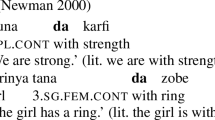Abstract
The paper introduces a first-order theory in the language of predicate tense logic which contains a single simple axiom. It is shewn that this theory enables times to be referred to and sentences involving ‘now’ and ‘then’ to be formalised. The paper then compares this way of increasing the expressive capacity of predicate tense logic with other mechanisms, and indicates how to generalise the results to other modal and tense systems.
Similar content being viewed by others
References
Åqvist, L. E. G., son. (1973). Modal logic with subjunctive conditionals and dispositional predicates. Journal of Philosophical Logic, 2, 1–76.
Blackburn, P. (1993). Nominal tense logic. Notre Dame Journal of Formal Logic, 34, 56–83.
Blackburn, P., de Rijke, M., & Venema, Y. (2001). Modal logic. Cambridge: Cambridge University Press.
Boolos, G. (1984). To be is to be the value of a bound variable (or to be some values of some variables). The Journal of Philosophy, 81, 449–450.
Bricker, P. (1989) Quantified modal logic and the plural de re, Midwest Studies in Philosophy Vol 14: Contemporary Perspectives in the Philosophy of Language II, (ed. P.French et al.), University of Notre Dame Press.
Cresswell, M. J. (1990). Entities and indices. Dordrecht: Kluwer.
Cresswell, M. J. (1996). Semantic indexicality. Dordrecht: Kluwer.
Cresswell, M. J. (2006). Now is the time. Australasian Journal of Philosophy, 84(2006), 311–332.
Forbes, G. (1983). Physicalism, instrumentalism and the semantics of modal logic. Journal of Philosophical Logic, 12, 271–298.
Forbes, G. (1985). The metaphysics of modality. Oxford: Clarendon.
Forbes, G. (1989). Languages of possibility. Oxford: Basil Blackwell.
Gabbay, D. M. & Malod, G. (2002). Naming worlds in modal and temporal logic. Journal of Logic, Language and Information, 11, 29–65.
Gabbay, D. M., Hodkinson, I., & Reynolds, M. (1994). Temporal logic: mathematical foundations and computational aspects. Oxford: Clarendon.
Gargov, G. & Goranko, V. (1993). Modal logic with names. Journal of Philosophical Logic, 22, 607–636.
Goranko, V. (1996). Hierarchies of modal and temporal logics with reference pointers. Language and Information, 5, 1–24.
Hughes, G. E. & Cresswell, M. J. (1996). A new introduction to modal logic. London: Routledge.
Humberstone, I. L. (2006). Modal logic for other world agnostics: neutrality and halldén incompleteness. Journal of Philosophical Logic, 36, 1–32.
Kuhn, S. T. (1980). Quantifiers as modal operators. Studia Logica, 39, 145–158.
Kamp, J. A. W. (1971). Formal properties of ‘now’. Theoria, 40, 76–109.
Lewis, D. K. (1970). Anselm and actuality. Noûs, 4, 175–188.
Lewis, D. K. (1973). Counterfactuals. Oxford: Basil Blackwell.
Marx, M. & Venema, Y. (1997). Multi-dimensional modal logic. Dordrecht: Kluwer.
Meyer, U. (2009). ‘Now’ and ‘then’ in tense logic. The Journal of Philosophical Logic, 38, 229–247.
Peacocke, C. (1978). Necessity and truth theories. Journal of Philosophical Logic, 7, 473–500.
Prior, A. N. (1957). Time and modality. Oxford University Press
Prior, A. N. (1967) Past, present and future. Oxford University Press
Prior, A. N. (1968) ‘Now’, Noûs Vol 2, pp. 101–119. (Reprinted in Prior 2003, pp. 171–193.)
Prior, A. N. (2003). In P. Hasle, P. Øhrstrøm, T. Braüner & J. Copeland (Eds.), Papers on time and tense. Oxford: Oxford University Press.
Prior, A. N. & Fine, K. (1977). Worlds, times and selves. London: Duckworth.
Quine, W. V. O. (1960a). Variables explained away. Selected logic papers (pp. 227–235). New York: Random House. 1966.
Quine, W. V. O. (1960b). Word and object. Cambridge: Mass, MIT.
Quine, W. V. O. (1971). Predicate functor logic. In J. E. Fensted (Ed.), Proceedings of the third Scandinavian logic symposium (pp. 309–315). Amsterdam: North Holland Publishing Co.
Schönfinkel, M. (1924). Über die bausteine der mathematischen Logik, Mathematische Annalen, vol 92 (pp. 305–316). Translated and discussed in J. van Heijenoort (Ed.), From Frege to Gödel. Cambridge: Harvard University Press. 1966.
Segerberg, K. (1971). An essay in classical modal logic (3 vols). Filosofiska studier: Uppsala.
Segerberg, K. (1973). Two-dimensional modal logic. Journal of Philosophical Logic, 2, 77–96.
Segerberg, K. (1980). A note on the logic of elsewhere. Theoria, 46, 183–187.
Stalnaker, R. C. (1968). A theory of conditionals. In N. Rescher (Ed.), Studies in logical theory (pp. 98–112). Oxford: Basil Blackwell.
Vlach, F. (1973). ‘Now’ and ‘then’. A formal study in the logic of tense anaphora. PhD dissertation, UCLA.
Author information
Authors and Affiliations
Corresponding author
Rights and permissions
About this article
Cite this article
Cresswell, M.J. Temporal Reference in Linear Tense Logic. J Philos Logic 39, 173–200 (2010). https://doi.org/10.1007/s10992-009-9122-x
Received:
Accepted:
Published:
Issue Date:
DOI: https://doi.org/10.1007/s10992-009-9122-x




